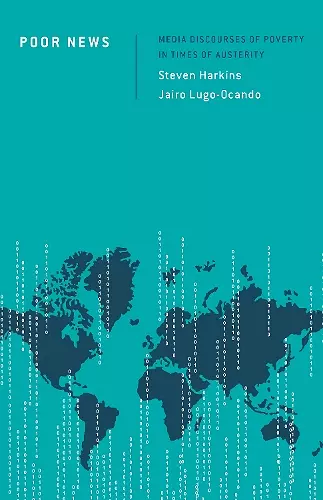Poor News
Media Discourses of Poverty in Times of Austerity
Jairo Lugo-Ocando author Dr Steven Harkins author
Format:Paperback
Publisher:Rowman & Littlefield International
Published:23rd Nov '18
Currently unavailable, and unfortunately no date known when it will be back
This paperback is available in another edition too:
- Hardback£125.00(9781783489268)

Poor News examines the way discourses of poverty are articulated in the news media by incorporating specific narratives and definers that bring about certain ideological worldviews. This happens, the authors claim, because journalists and news editors make use of a set of information strategies while accessing certain sources within specific social and political dynamics. The book looks at the case of the news media in Britain since the industrial revolution and produces a historical account of how these media discourses came into play. The main thesis is that there have been different historical cycles that reflect particular hegemonic ideas of each period. Consequently, the role of mainstream journalism has been a subservient one for existing elites when it comes to the propagation of dominant ideas.
Harkins (Fife College, UK) and Lugo-Ocando (Univ. of Leeds, UK) suggest that British journalists report about poverty as it is depicted by Britain’s political and economic elites. The authors note that British news organizations occasionally challenge government and institutional claims about the status of the UK’s impoverished populations. However, the authors suggest, overall news coverage reflects elite views about who deserves welfare and whether public policies to counter poverty are pragmatic. In a commendable use of mixed methods in mass communication research, some of the authors’ conclusions are based on a content analysis of 2,214 articles published in four British national newspapers between 1985 and 2015, and some of the analysis is qualitative. The text provides helpful footnotes and a comprehensive bibliography. The book is an excellent companion to a recently published book by Michael Clay Carey, The News Untold: Community Journalism and Poverty in Appalachia (Univ. of West Virginia, 2017). Recommended for collections in sociology, social and economic disparities, journalism, and mass communication research. Summing Up: Recommended. Upper-division undergraduates through faculty. * CHOICE *
The granular content analysis offered by the book gives great insight into the normalisation of social inequality across the British media landscape […] and will be of interest to those looking to formulate a more ethical and inclusive journalism. […] Whilst avoiding detailed discussion of the modern media landscape, Poor News still provides a strong deconstruction of how debates on poverty in Britain have been shaped by the mainstream press. Its content analysis of a range of papers, including the Daily Telegraph, the Sun and the Guardian, is robust, offering a convincing exposé of how print outlets normalise social inequality, regardless of their political standpoints. What’s more, its granular approach to various sub-debates and issues will give great insight to researchers interested in ethical journalism, public opinion on poverty and the British media landscape. * LSE Review of Books *
This book is timely and makes a valuable contribution to a lacuna in the field i.e. how journalists have over time engaged with value-laden and emotive issues of poverty. The authors have done particularly well in teasing out the ideational dimensions of the reporting, the nuances in coverage and contentious policies such as the “bedroom tax” and fuel poverty. -- Anita Howarth, Senior Lecturer, Department of Social Sciences, Media and Communication at Brunel University London
Poor News: Media Discourses of Poverty in Times of Austerity is a timely, highly engaging and thought-provoking contribution to the debates about news coverage of poverty and welfare in the age of neoliberalism. Situating the discourses of poverty in a historical context and exploring specific empirical examples, the book provides a fascinating analysis of the relationship between media, ideology and public perceptions about poverty and welfare. -- Ekaterina Balabanova, Senior Lecturer in Political Communication at the University of Liverpool
This incisive analysis of the media’s discursive complicity in fostering the neoliberal imagination is an important intervention. It exposes journalism’s alignment with powerful interests and holds it accountable to the duties of social justice, truthtelling and the pursuit of human dignity. Its message resounds beyond the immediate context of analysis to a wider world marked by inequality and poverty. -- Herman Wasserman, Professor of Media Studies at the University of Cape Town
ISBN: 9781783489275
Dimensions: 232mm x 163mm x 19mm
Weight: 363g
238 pages